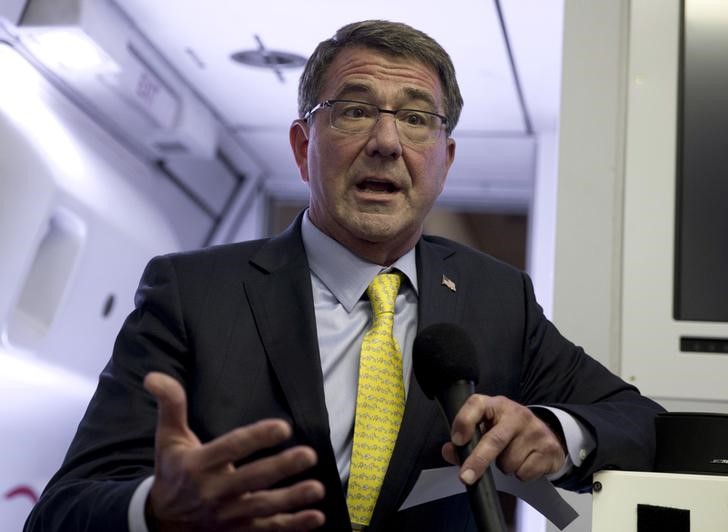By Andrea Shalal and Yeganeh Torbati
WASHINGTON (Reuters) - Pentagon officials warned on Wednesday against further consolidation in the U.S. weapons industry because fewer defense contractors could lead to higher costs, decreased innovation and less competition.
U.S. Defense Secretary Ash Carter said he does not welcome further consolidation among large U.S. weapons makers. Carter was the Pentagon's chief arms buyer in 2011, when the department established a policy that discouraging mergers among large prime contractors, but opened the door to deals among smaller firms.
"What I said then and still believe is that it was important to avoid excessive consolidation in the defense industry to the point where we did not have multiple vendors who could compete with one another on many programs," Carter told reporters.
The comments came days after the U.S. Justice Department approved Lockheed Martin (NYSE:LMT) Corp's $9 billion acquisition of Sikorsky Aircraft, a unit of United Technologies Corp (NYSE:UTX), one of the biggest acquisitions in the weapons industry in years. Lockheed expects to close the deal by the end of November or sooner, depending on when it wins regulatory approval from China and the European Union.
"Lockheed-Sikorsky doesn't mean open season on large prime-level mergers," said Jeff Bialos, a former senior Pentagon official who oversaw industry mergers and acquisitions.
Dozens of companies in the sector merged in the 1990s as military spending fell sharply after the end of the Cold War. The changes left five large contractors that dominate the market: Lockheed, Boeing (NYSE:BA) Co, Northrop Grumman Corp (NYSE:NOC), General Dynamics Corp (NYSE:GD) and Raytheon Co.
Defense Undersecretary Frank Kendall told reporters the U.S. Justice Department had cleared the Lockheed-Sikorsky deal because there was no direct anti-competitive issue, but the department did not want to see its industrial base whittled down to two or three very large suppliers.
He said the Pentagon would continue working with the Justice Department and the Federal Trade Commission to ensure mergers did not reduce competition. Defense officials also planned to meet with Congress to explore legal options to preserve the diversity and breadth of the U.S. defense industry.
Kendall said the deal would strengthen Lockheed, the Pentagon's largest supplier, and further reduce the dwindling number of contractors bidding for weapons contracts. Future deals would be evaluated case-by-case, he said.
"This transaction is the most significant change at the weapon system prime level since the large-scale consolidation that followed the end of the Cold War," he said.
He said the deal would move a high percentage of the military helicopter market into a company that dominates the U.S. fighter jet market, due to a winner-take-all approach adopted over a decade ago for the F-35 fighter jet program.
"With size comes power, and the department's experience with large defense contractors is that they are not hesitant to use this power for corporate advantage," he said.
Lockheed fired back in a rare display of disagreement with its largest customer.
"There is no evidence to support the view that larger defense companies reduce competition or inhibit innovation," Lockheed spokesman Dan Nelson said in statement.

"We believe that defense contractors should continue to be assessed based on the performance and effectiveness of the products and solutions offered, not on the size of their company," he said.